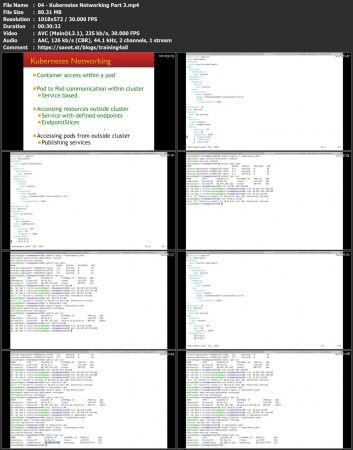[ FreeCourseWeb.com ] Kubernetes Advanced Techniques
Download More Latest Courses Visit -->> https://FreeCourseWeb.com

Video: .MP4, 1018x572 30 fps | Audio: AAC, 44.1 kHz, 2ch | Duration: 7h 18m
Genre: eLearning | Language: English | Size: 0.97 GB
Kubernetes Advanced Techniques covers these 12 topics:
Kubernetes Primer. Be able to explain Kubernetes basic techniques during this first topic in the Kubernetes Advanced Techniques course. If you have not watched Anjum’s Kubernetes Made Simple course, or if you have not used Kubernetes in some time, this first session will provide a refresher. Learn what Kubernetes is, create a Kubernetes cluster, and run stateless applications, services, and stateful applications.
Kubernetes Networking Part 1. Use networking to access pods within the Kubernetes cluster during this second topic in the Kubernetes Advanced Techniques course. Know that there are multiple levels of network access that are required. Become familiar with bridge and CNI virtual networking, EndPointSlides, and Nodeport.
Kubernetes Networking Part 2. Practice accessing resources that exist outside the Kubernetes cluster during this third topic in the Kubernetes Advanced Techniques course. Become competent with service-based communication.
Kubernetes Networking Part 3. Publish the services outside of our Kubernetes cluster so Internet users can access these services during this fourth topic in the Kubernetes Advanced Techniques course. Practice using externalIP and LoadBalancer.
Kubernetes Networking Part 4. Use Kubernetes networking to interface with Ingress during this fifth topic in the Kubernetes Advanced Techniques course. Learn the advantages of using Ingress and also Ingress’ limitations.
Kubernetes Networking Part 5. Master service topology during this sixth topic in the Kubernetes Advanced Techniques course. Practice using externalTrafficPolicy.
Namespaces and Resources. Practice using namespaces and resources during this seventh topic in the Kubernetes Advanced Techniques course. Learn what namespaces and resources are used for and how to specify them in the various Kubernetes files. Also learn the limitations of resources and all about defaults.
Horizontal Pod Autoscaling. Practice autoscaling (scaling up or down) in a Kubernetes cluster during this eighth topic in the Kubernetes Advanced Techniques course. Increase or decrease the number of active replicas.
Probes. Use probes to achieve certain tasks during this ninth topic in the Kubernetes Advanced Techniques course. Probes helps Kubernetes (Kubelet) monitor the pods and take appropriate action.
Updating Deployments. Update Kubernetes deployments during this tenth topic in the Kubernetes Advanced Techniques course. Practice adding or changing probes, changing the number of replicas, and updating the container images.
RBAC-based Security. Practice Role-Based Access Control (RBAC) security during this 11th topic in the Kubernetes Advanced Techniques course. Practice creating roles and assigning CRUD access for resources to these roles, and assigning roles to users.
Logging. Practice logging and Helm during this 12th topic in the Kubernetes Advanced Techniques course. Logs provide significant insight into cluster operation. Helm is software that can be used to template the deployment of Kubernetes.
Use Winrar to Extract. And use a shorter path when extracting, such as C: drive
ALSO ANOTHER TIP: You Can Easily Navigate Using Winrar and Rename the Too Long File/ Folder Name if Needed While You Cannot in Default Windows Explorer. You are Welcome ! :)
Download More Latest Courses Visit -->> https://FreeCourseWeb.com
Get Latest Apps Tips and Tricks -->> https://AppWikia.com
We upload these learning materials for the people from all over the world, who have the talent and motivation to sharpen their skills/ knowledge but do not have the financial support to afford the materials. If you like this content and if you are truly in a position that you can actually buy the materials, then Please, we repeat, Please, Support Authors. They Deserve it! Because always remember, without "Them", you and we won't be here having this conversation. Think about it! Peace...




